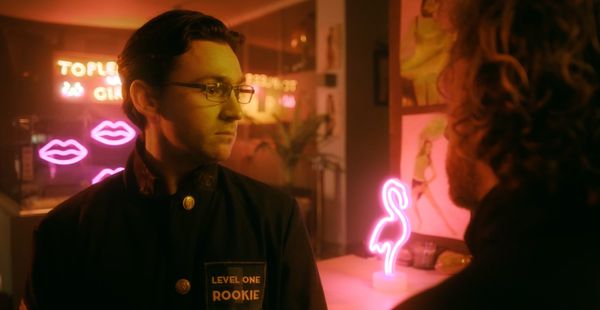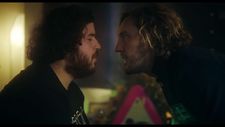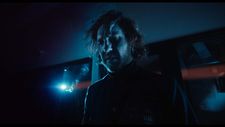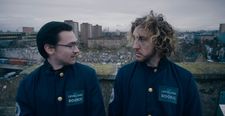 |
| Scott Haran and Seann Walsh in The Bystanders |
A small film which is making a big noise on the festival circuit this year, and which recently screened as part of Sci Fi London, Gabriel Foster Prior’s The Bystanders is an amiable genre comedy focused on the life of a man recruited into a shadowy organisation which spies on the lives of strangers – and intervenes in small ways to make them happier. It’s an interesting twist on an old science fiction trope which is also, at its core, a story about friendship, as Pete (Scott Haran) bonds with his recruiter, Frank (Seann Walsh) only to realise that they have very different ways of looking at the world. Just prior to that festival screening, Gabriel and I arranged to chat, and he told me about how he found his way into filmmaking.
“I started making films with friends when I was a teenager, kind of as a hobby,” he recalls. “I was doing graphic design and I went to Art Foundation in Brighton, and one of the teachers saw the films that I'd been making with my friends, and it was her idea to apply to film schools rather than carry on with the graphic design. I went to Edinburgh College of Arts and in Edinburgh, I directed short films – we all directed short films – but I ended up mostly doing editing. In my first year I did one of the graduation films and it was nominated for a Scottish student short film BAFTA. That was a nice feeling. We were very excited about it, and I think that made me feel like editing was something that I was good at.
“I got a chance to start editing feature films when I was 27, and that came through working for a sales company and doing trailers and promos. So it's kind of unconventional route to take to start working on features. In the last 10 years my main focus has been on editing films. I've had a chance to make a few short films, but not very prolifically, because editing was my job and it can be very busy.”
 |
| Subject Luke (Andi Jashy) with Frank (Seann Walsh) |
He didn’t really think of The Bystanders as a science fiction film, he says, until it started to get into science fiction film festivals, but he did know that he wanted a retro science fiction style score, which his dad, Foz Foster. ended up creating.
“I didn't think of Sci Fi as being my thing, especially, but then it depends how you define it because Eternal Sunshine Of The Spotless Mind and Donnie Darko are sci-fi, right? Those are some of my favourite films. I guess when people think of sci-fi, they often think about space. Saying that, I do actually also like space stuff. I’m a big Star Trek Voyager fan. So I do definitely have some sci-fi sympathies, but until this film I didn't realise that it was specifically my thing. My new projects could also be categorised as sci-fi.”
Some people have responded to the film by telling him that they want to know more about the world of the bystanders, he says, but he was hesitant to go down that road.
“We made a joke of it when Pete's getting taught about the bystanders at the beginning. I think that’s well-trodden turf. Sometimes it feels like the first half of these types of movies is taken up by explaining all the stuff, and then you've only got half the time left to actually do the movie. To me, the more important thing was that the two bystanders, Frank and Pete, have opposing views on the world. It’s more about their characters than it is about the infrastructure of the Bystanders world.”
I tell him that I think a lot of people will relate to the feeling of being in a first job in which very little has been explained.
“I hadn't thought of that,” he says, “but when I was writing I was just starting to have big editing jobs. I don't know if that's a coincidence. But I guess there’s a coming of age element, even though he's in his thirties. It could be seen as one of those archetypal stories you often get in teen films. They have a friend who's both a bad influence and a good influence, and they've got something to teach each other.”
We discuss the origins of the film.
“There were two initial ideas, and they kind of formed one idea,” he says. “In the very, very first version of this film, the title was God Particles, and it was basically having human versions of the Higgs boson. My very basic understanding of the very, very complicated science is that they discovered these particles which just appear out of nowhere, make a little change and then disappear again. So I had this idea of these two personifications, but one of them loved humans and one of them hated humans. That was the really initial idea.
“The other idea I came up with when I was with my brother playing computer games, and we spent, you know, 45 minutes deciding on whether we should have a certain type of armour with better stats than another one. And it occurred to me that if we did have guardian angels, they would be so bored and hate us. And I thought, actually that's quite funny. And then I realised that I'd had two ideas that were the same idea. So the very basic characters that I'd come up with for the God Particles thing, they could be the guardian angels, where one of them hates the guy who plays computer games. Those two ideas merged into the initial idea.”
He then began working on the script with his friend and co-writer Jack Hughes, he explains, and took a few years to get it to the stage where he could begin production.
“When it came to the budget, I decided I'd actually do better by breaking the rules and doing what you're not meant to do with a low budget film. That was a way of standing out. So you're not meant to have different locations or a swimming pool or a football stadium. Any low budget film masterclass will tell you to set it all in one location.”
 |
| Frank (Seann Walsh) in recruitment mode |
I mention that I was impressed by a scene set in a changing room. Shooting in places like that can be a nightmare because of all the reflective surfaces. He tells me that getting it right involved three cinematographers, and that the scene also presented other challenges.
“The thought was to flip the way those scenes work. I grew up on Eighties and Nineties movies and you would never have an invisible people movie without going into a girls’ locker room. Obviously we didn't want to do that, but we thought, oh, maybe it's funny if we have one of them who wanted to do that and somehow it backfired.”
Without wanting to introduce spoilers, one might simply say that there are naked people in the scene, but not quite as that bystander planned. They are very discreetly shot, but nevertheless, some volunteers chickened out at the last minute, so changes had to be made, and Gabriel is very grateful to the one who stuck it out and wasn’t fazed by anything.
Taking on scenes like that was important to him, he explains, because most low-budget films are shot in rented flats with plain white walls and all look the same.
“I was very conscious that I didn't want this to be a 'white wall' movie, another film shot in a rented London flat with floating heads in front of white backgrounds. I really wanted to make sure that visually, it was more interesting than that. But sourcing the locations on a low budget was probably one of the hardest elements. And then once you do get those locations, often you don't have them for as long as you want or sometimes you have one and then it pulls out just before you go there. So when people say not to do that on a low budget, they are completely correct.”
His devotion to the film was such that he actually slept on set.
“Luke’s stoner bedroom – I had to sleep in that room for the whole of the shoot. I was not getting enough sleep and I was dealing with directing my first film and sleeping in a room that was full of ashtrays and pot noodles and bongs. As well as being a stoner bedroom set, there was all the camera equipment.”
Some of the best advice he got, he says, came from one of the production managers, Simon Lewis Marriott.
“He said to me that low budget filmmaking is like boxing. You might do your prep and think about the fight and what's the other fighter’s strengths and weaknesses, but once you get into the ring, you can't be in your head, you've got to be on your feet. The world is going to be throwing punches at you and you've got to be bobbing and weaving. He was so right. There were so many things which we shot that are not in the script. Locations that are different, that are not the location that it was written in there, the scenes that we made up on the spot because we needed to fill a gap when other scenes couldn't be done. The whole approach was basically dealing with the punches, but crucially making the solutions seem designed and feel like they were always the plan when you watch the film.”
We discuss casting and he explains that he’d worked with Seann Walsh previously.
“I always knew I wanted to have him play Frank. And there were a couple of people that I wanted to bring on board. I always knew I wanted Marek [Larwood] because he's so good, so I wrote Norm really hoping that he would do it. And then when it came to casting Pete I was trying to get someone that was really good but would get along with Seann. Obviously they can always act onscreen friendships but I always feel on some level we can tell whether people really like each other or not. If they really get on, I think that helps.
 |
| Best friends forever? |
“I had enough friends that worked in the film industry to be able to crew up the film, but I didn't know enough actors to populate an entire feature film. So key to this actually happening was meeting Alex Fidelski, who runs The Reel Scene, which is an acting school in London, and he’s also an agent and a producer. He really liked the project and he said he could help. A lot of the supporting cast were people that were either doing classes at his school or had done classes at his school. Loads of people were really up for it. And some of them said ‘Not only do I want to come and be in the movie, but can I also come and help?’ so we also got assistants and runners, and that was key to getting the film made.
“Scott Haran was the star of a BBC show called Wizards Vs. Aliens, written by Russell T. Davis, when he was young, so in a way he was a child prodigy. I quite like that, the symmetry between his story and Pete’s. That's not why I cast him – I cast him because his audition was great. And then Georgia Mabel Clarke and Andi Jashy, Alex brought on board as well. They are both really talented up-and-coming actors and have big futures.”
The film has already screened in Germany, Spain and Brazil , and has secured distribution in quite a few territories, he says, so it’s an exciting time. That’s going to be helpful when it comes to making his next two projects, one of which involves aliens and the other the Bermuda triangle. He describes them as hybrid sci-fi films. In the meantime, people who didn’t manage to catch the Bystanders in London may have a chance to see it elsewhere in the UK when it enjoys a small theatrical run in the Autumn.
As for Sci Fi London, it’s a festival which meant a lot to him.
“I edited a film called Lucid, which played Sci Fi London, while I was writing Bystanders, and we all had a really good time. I remember being at that screening and thinking ‘If I ever make this movie, I would really like to come back to Sci Fi London to share my film here. That was one of my inspirations to get the movie done, so it was really, really super cool to be asked by them to do it.”





















